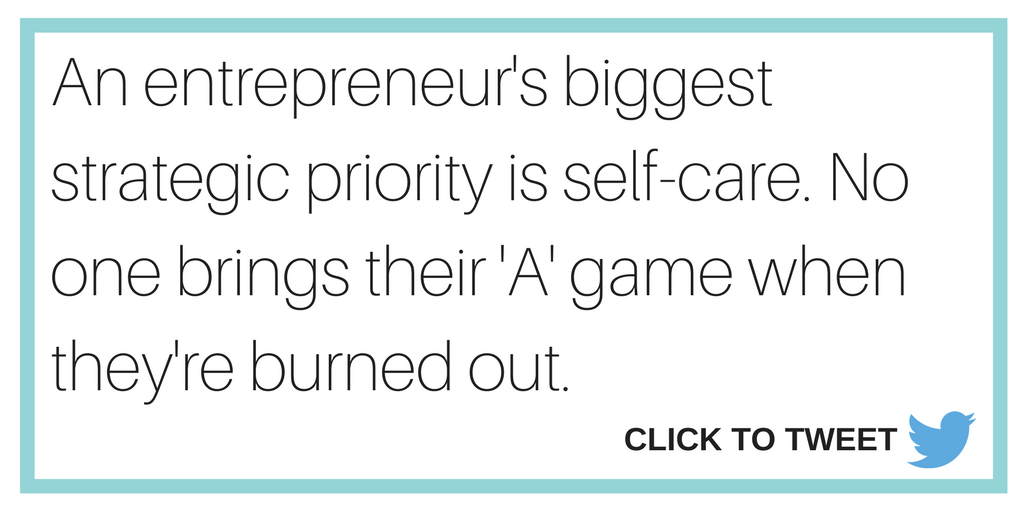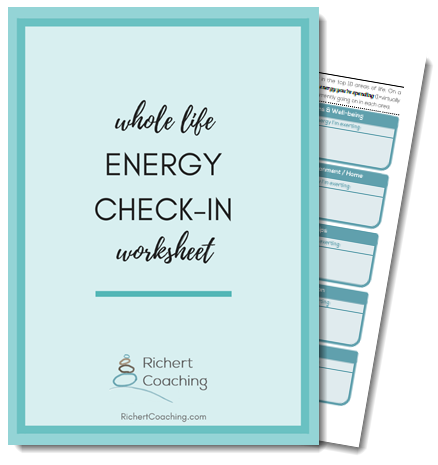You know. The piles of laundry waiting to be folded. The way we look after sitting at our desks for 15 straight hours to meet a looming deadline. Or, after however many days of wearing the same yoga pants and baggy sweatshirt and uttering that you'll "just finish this one more thing" before you finally get in the shower.
The truth is, entrepreneurs love the opportunity to exercise creative freedom and get lost in a project. That feeling of a combined sense of autonomy, agency, and a dose of stress from constantly working to stay relevant, innovative and inspired is a freaking rush.
It's exhilarating.
And, it's also exhausting. While you're running the show and changing the world, self-care is often the first priority that gets cut.
I have to confess, self-care does not come naturally to me by any means. Instead, there's a tiny, cranky drill sergeant that sits on my shoulder and harps in my ear about taking time away from my business to focus on myself. "Who has time for all that self-indulgence?! Get back to work!!"
But the truth is, when you're an entrepreneur, you ARE you're business. Self-care is not just a necessary practice, it should be your biggest strategic priority. No one brings their "A" game when they're burned out, stressed, or exhausted.
But, how do you prioritize? There are dozens of self-care practices that people will tell you are critically important--while you're trying to run a business, nurture your family, and maintain your sanity all at the same time. How do you fit them all in?
The answer is simple: decide on the top self-care priorities for you, and schedule everything else around them. Here are the top 5 self-care practices in my own routine, and how I manage to fit them into a busy schedule.
Sleep
One thing that has always been clear to me is that I don't function anywhere near my full potential when I'm lacking sleep. My body has also developed a pretty natural sleep cycle, and I have not used an alarm clock for many years (except for the rare times when I have a can't-miss appointment and need a back-up plan). I naturally wake up somewhere between 5-5:30am on most days, and I'm yawning by around 9:30pm.
However, if I'm in the midst of a new project, I often find that my brain has trouble shutting down at night. It's not uncommon for me to lay awake trouble-shooting something or outlining an idea in my head until 1am or later. For a day or two, my internal alarm clock won't be affected, although I'll likely run at a slower pace during the workday. But if this carries on for too long, my biorhythms start to shift, and it becomes tough to get back on track.
To manage against this, I make a serious effort to cut myself off from work-related activities by around 7pm. From that point until my head hits the pillow, I try to engage in a pretty predictable evening routine that involves one-on-one time chatting with my husband, snuggling with the dog, and disengaging my brain from its normal figure-stuff-out-and-be-creative mode. Having a solid bedtime routine that triggers my mind and body to focus on rest is also helpful.
Hydration and Nourishment
The minute my eyes pop open in the morning, I am ready to get to work. I also do most of my writing in the morning because that seems to be my most creative time of the day. This means, I have to work extra hard to make sure I'm eating a healthy breakfast, otherwise, I am likely to crash around 11am, spend the afternoon watching reruns of old TV shows, and blow off the rest of the day.
Those aren't great qualities in someone who runs a business.
Since I know this is one of the most challenging areas for me, I do what I can to make it as easy as possible. My coaching clients hear me say this all the time: Don't make it hard on yourself to be awesome. If you know what your challenges are, take every conceivable roadblock out of the equation to give yourself a leg up.
For me, this means setting aside 1-2 hours per month to prep healthy foods for our freezer. Now, before you jump on me about how freezing reduces vitamin content, blah, blah, blah--let me tell you this: eating frozen fruits and vegetables is better than greasy take-out or processed foods any day of the week. When you're working hard to run a business, try not to let perfection be the enemy of good.
Here's how I do it.
First, I prep and freeze vegetables that we commonly use in everyday recipes. In our house, these are: onions, bell peppers, carrots, broccoli, cauliflower, scallions, and snow peas. If you buy several of these items at one time, it reduces the overall prep time, and you can have these ingredients on hand for the coming month (saving you loads of time on weeknights when you're too tired to chop vegetables for healthy meals).
For example, when I prepped our peppers and onions this month, I diced 8 bell peppers (2 of each color) and two onions. This makes about 2.5 quarts of veggies for the freezer that can easily be tossed into a recipe or sautéed quickly during the week.



Second, since breakfast is my biggest hurdle, I have smoothies every morning. This way, I'm assured that I'll start out with lots of vitamins and nutrients for the day. To make that routine faster, I prep my smoothie fruits into single-serving pouches once a month so that, in the morning, I can quickly dump one into the blender and erase my excuse that I don't have time for breakfast.
RELATED: The Breakfast of Creative Champions
Finally, in terms of hydration, I know I will drink a lot more water if I add ice to my insulated cup AND if I use a straw*. That may not work for everyone, but I know that it works for me, so I keep doing it. I have no problems hitting my targets each day when I stick to this routine. Again, don't make it hard on yourself to be awesome--go with what works for you.
[*Side note: This adds up to quite a lot of straws per year, and plastic straws are a pretty big eco-problem. For this reason, I switched to compostable straws. You can toss these into your compost bin or yard waste container and make a big difference.]
Movement
When I'm in the middle of a project, it is SO easy to lose track of time. Before I know it, I might have been sitting at my desk for five straight hours. This is unhealthy on so many levels.
An easy way to ensure that you'll move regularly is to drink more water. Having to take frequent bio-breaks will force you to step away from zombie-land, and you can make it a habit to climb an extra flight of stairs or stretch for a few minutes each time.
But fitting in longer cardio sessions is the harder part, for me. The only effective way I've found to make it happen is to actually plan it into my daily schedule. When I treat it like an actual appointment, it happens. When I treat it like a to-do list item, it becomes the easiest thing to push off the side of my desk until "tomorrow".
I don't want to pretend this is easy just because it's on my calendar. I make some extra effort here, as well, in terms of multitasking. If I'm going to spend 45 minutes on the elliptical, that's just about the perfect amount of time to listen to a podcast or stream an episode of a good drama. I have a mobile queue for both, and it makes your workout go by really quick while you still accomplish other things on your list!
Mental Space
When you're in charge of calling all the shots for your business, you can easily begin to experience decision-fatigue. In psychology, this is what happens when we become overwhelmed by the large number of choices we frequently face. Ultimately, it can lead to poor decisions, impulsiveness, and an impaired ability to self-regulate.
When we become so intensely focused on our passion and work, it can sometimes mean that there's no room for your brain to rest and recharge.
This is why, at least once a week, I make time to just daydream. When the weather is nice, I like to sit outside and simply listen to the sounds of the wind blowing through the trees, birds chirping, or, at my house, sheep munching bunches of grass. During cold-weather months, I love a good soak in the tub.
No matter how you do it, making some mental space allows your mind to take a little break from the hard work of always thinking about what comes next. I find that this time-out is often rewarded with a new batch of creative ideas a day or two later, as well.
Do Something JUST For You
Most entrepreneurs have a desire to serve in some way. Whether you are making the world beautiful through your art, helping, teaching or inspiring others, or creating a product to solve your customers' problems, you're constantly giving yourself to your work.
Taking some time to do something that is only for you and no one else is an important part of self-care.
For me, this is often some form of a passion project. This is something that fuels me in a different way than the energy I get from my day-to-day work. Recently, it was a trip to my favorite nursery followed by a couple of hours filling up window boxes with colorful plants. Another time, it was refinishing an old piece of furniture I'd found at a second-hand shop. The activity changes over time, but the goal is always the same--to give my soul some nourishment simply because it feels good.
It's important to remember that you can't pour from an empty cup. And, if you're an entrepreneur, it's also essential to make investments in the maintenance and well-being of your greatest business asset--YOU.
Find the self-care practices that are highest on your list of priorities, and begin treating them like strategic business objectives. You'll find that the return on your investment is well worth the time!
Need help prioritizing the self-care practices that will be most meaningful to you? I've got you covered. Download my Whole Life Energy Check-In worksheet to evaluate the top areas where you might want to make a personal investment. I use this worksheet once each quarter to ensure that all areas are aligned for maximizing my effort and potential.

RELATED POSTS
|
|
||||
| Meaningful Work: The Secret Recipe | ____ | The Breakfast of Creative Champions | ____ | Blog Archive |








